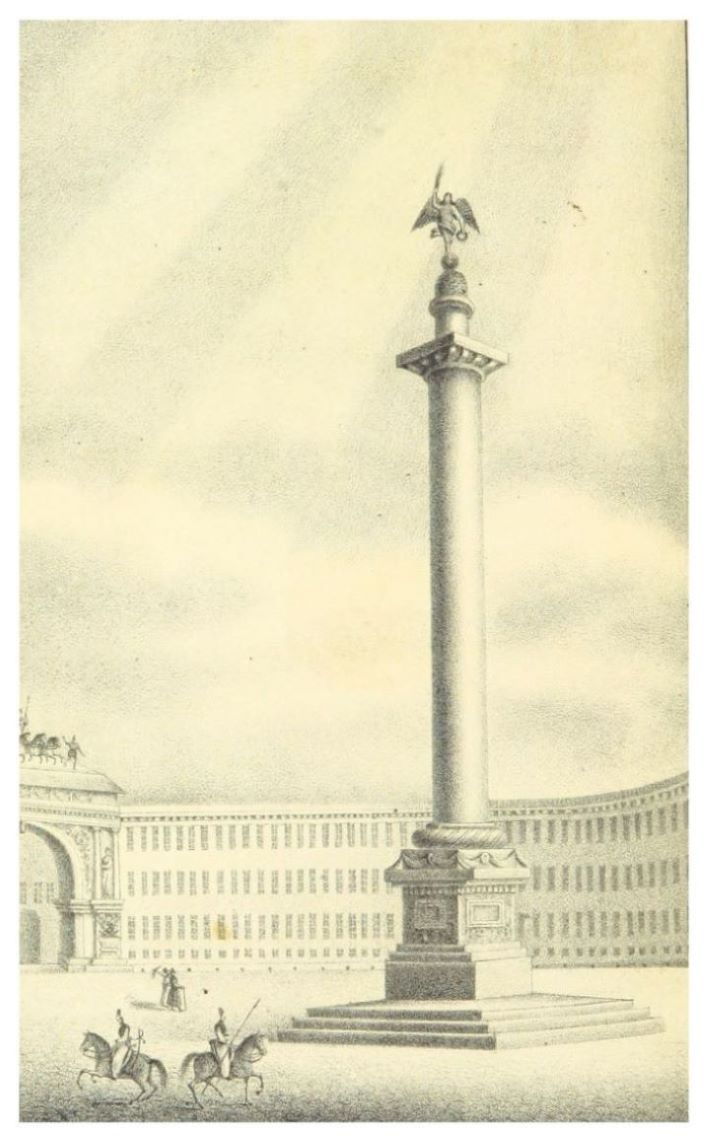Pushkin’s imitation of Horace’s Ode 3.30 closely follows the form and content of Derzhavin’s 1795 imitation. Written in 1836, about five months before Pushkin was fatally wounded in a duel, the poem became his testament. It could not have passed censorship due to its defense of “Freedom” and the belittling mention of the Alexander Column, which commemorated Tsar Alexander I, and was published posthumously with appropriate emendations in 1841.
Exegi monumentum
I’ve raised a monument not made by human hands.
The people’s feet will keep the path to it well-trodden,
and with its unbowed head, far loftier it stands
than Alexander’s soaring column.
I won’t die wholly. In the lyre that I revere,
my spirit will outlive my dust and cheat decay,
and I’ll be famed as long, in this sublunar sphere,
as just one poet sees the day.
Soon word of me will spread throughout enormous Rus,
and mine will be a name each tongue will learn to speak:
the haughty son of Slavs, the Finn, the wild Tungus
and, brother of the steppes, Kalmyk.
The people long will cherish me: my lyre has roused
the best of sentiments within the hearts of all,
and in my cruel age, it’s Freedom I espoused
and mercy’s boon to those who fall.
O be obedient, my Muse, to God’s decree:
demand no laurel wreathes, don’t cower from abuse,
treat praise and slander both with equanimity,
and take no part in fools’ disputes.
Crib
Exegi monumentum
I have erected to myself a monument not made by hands,*
the people’s path to it will not be overgrown,
it has risen higher, with unsubmissive head,
than the Alexander Сolumn.**
No, not all of me will die: the soul in the sacred/cherished lyre
will outlive my ashes/dust and escape decay,
and I will be renowned while, in the sublunary realm,
even one poet is alive.
Rumor of me will pass through all of great Rus,***
and each tongue existing within it will name me,
the proud grandson of Slavs and the Finn and the now-wild
Tungus and the Kalmyk, friend of the steppes.****
And long will I be pleasing to the people for the fact
that I, with my lyre, roused good feelings,
that in my cruel age I lauded Freedom
and called for mercy to the fallen.
To the command of God, O Muse, be obedient,
without fearing offense, without demanding a wreath/crown,
accept praise and slander with equanimity,
and don’t argue with a fool.
* “Not made by hands” is a single Russian word, “nerukotvornyi,” a calque of the Greek “acheiropoieta.” In Orthodox iconography, it refers to icons of Jesus and the Virgin Mary that are said to have come into being miraculously and so were not created by human hands. Pushkin may have been influenced by Vasily Ruban’s use of the word in a 1770 poem to describe an enormous natural rock chosen as the pedestal for an equestrian statue of Peter the Great. Today that monument is known by the name Pushkin gave it: the Bronze Horseman.
** The Alexander Column was unveiled in St. Petersburg’s Palace Square in 1834 to commemorate Alexander I’s victory over Napoleon. The monument—a freestanding column of red granite mounted on a pedestal and topped by a statue of an angel—is 155 feet, 8 inches high.
*** “Rus,” a name for the territory ruled by Kiev in the ninth to twelfth centuries, is here extended to the empire ruled by St. Petersburg in the nineteenth century, including Poland and Finland. “Rus” became “Rossia” in Russian by way of Byzantine Greek.
**** The “haughty son” (actually “grandson”) of Slavs may refer to the Poles, who were typically portrayed by Russians as haughty. They would then represent the western limits of the Russian empire, with Finns in the North, Tungus in Eastern Siberia and Kalmyks in the southern steppes.
Original
Exegi monumentum
Я памятник себе воздвиг нерукотворный,
К нему не зарастет народная тропа,
Вознесся выше он главою непокорной
Александрийского столпа.
Нет, весь я не умру — душа в заветной лире
Мой прах переживет и тленья убежит —
И славен буду я, доколь в подлунном мире
Жив будет хоть один пиит.
Слух обо мне пройдет по всей Руси великой,
И назовет меня всяк сущий в ней язык,
И гордый внук славян, и финн, и ныне дикой
Тунгус, и друг степей калмык.
И долго буду тем любезен я народу,
Что чувства добрые я лирой пробуждал,
Что в мой жестокий век восславил я Свободу
И милость к падшим призывал.
Веленью божию, о муза, будь послушна,
Обиды не страшась, не требуя венца,
Хвалу и клевету приемли равнодушно
И не оспоривай глупца.


